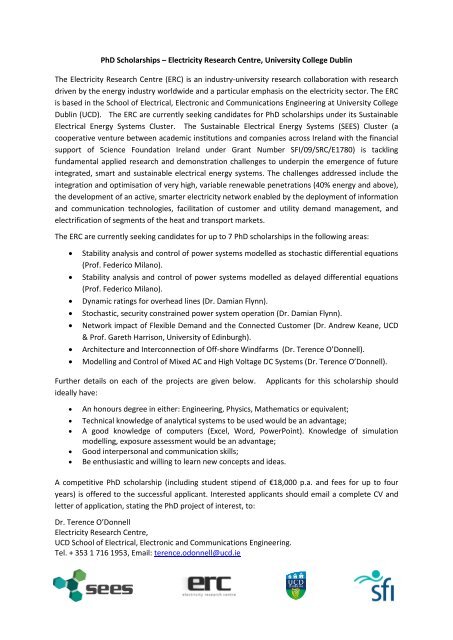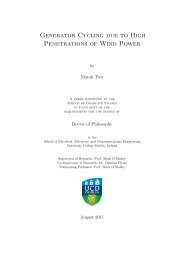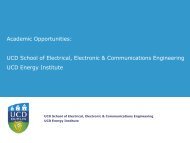PhD Scholarships â Electricity Research Centre, University College ...
PhD Scholarships â Electricity Research Centre, University College ...
PhD Scholarships â Electricity Research Centre, University College ...
You also want an ePaper? Increase the reach of your titles
YUMPU automatically turns print PDFs into web optimized ePapers that Google loves.
<strong>PhD</strong> <strong>Scholarships</strong> – <strong>Electricity</strong> <strong>Research</strong> <strong>Centre</strong>, <strong>University</strong> <strong>College</strong> Dublin<br />
The <strong>Electricity</strong> <strong>Research</strong> <strong>Centre</strong> (ERC) is an industry-university research collaboration with research<br />
driven by the energy industry worldwide and a particular emphasis on the electricity sector. The ERC<br />
is based in the School of Electrical, Electronic and Communications Engineering at <strong>University</strong> <strong>College</strong><br />
Dublin (UCD). The ERC are currently seeking candidates for <strong>PhD</strong> scholarships under its Sustainable<br />
Electrical Energy Systems Cluster. The Sustainable Electrical Energy Systems (SEES) Cluster (a<br />
cooperative venture between academic institutions and companies across Ireland with the financial<br />
support of Science Foundation Ireland under Grant Number SFI/09/SRC/E1780) is tackling<br />
fundamental applied research and demonstration challenges to underpin the emergence of future<br />
integrated, smart and sustainable electrical energy systems. The challenges addressed include the<br />
integration and optimisation of very high, variable renewable penetrations (40% energy and above),<br />
the development of an active, smarter electricity network enabled by the deployment of information<br />
and communication technologies, facilitation of customer and utility demand management, and<br />
electrification of segments of the heat and transport markets.<br />
The ERC are currently seeking candidates for up to 7 <strong>PhD</strong> scholarships in the following areas:<br />
<br />
<br />
<br />
<br />
<br />
<br />
<br />
Stability analysis and control of power systems modelled as stochastic differential equations<br />
(Prof. Federico Milano).<br />
Stability analysis and control of power systems modelled as delayed differential equations<br />
(Prof. Federico Milano).<br />
Dynamic ratings for overhead lines (Dr. Damian Flynn).<br />
Stochastic, security constrained power system operation (Dr. Damian Flynn).<br />
Network impact of Flexible Demand and the Connected Customer (Dr. Andrew Keane, UCD<br />
& Prof. Gareth Harrison, <strong>University</strong> of Edinburgh).<br />
Architecture and Interconnection of Off-shore Windfarms (Dr. Terence O’Donnell).<br />
Modelling and Control of Mixed AC and High Voltage DC Systems (Dr. Terence O’Donnell).<br />
Further details on each of the projects are given below.<br />
ideally have:<br />
Applicants for this scholarship should<br />
<br />
<br />
<br />
<br />
<br />
An honours degree in either: Engineering, Physics, Mathematics or equivalent;<br />
Technical knowledge of analytical systems to be used would be an advantage;<br />
A good knowledge of computers (Excel, Word, PowerPoint). Knowledge of simulation<br />
modelling, exposure assessment would be an advantage;<br />
Good interpersonal and communication skills;<br />
Be enthusiastic and willing to learn new concepts and ideas.<br />
A competitive <strong>PhD</strong> scholarship (including student stipend of €18,000 p.a. and fees for up to four<br />
years) is offered to the successful applicant. Interested applicants should email a complete CV and<br />
letter of application, stating the <strong>PhD</strong> project of interest, to:<br />
Dr. Terence O’Donnell<br />
<strong>Electricity</strong> <strong>Research</strong> <strong>Centre</strong>,<br />
UCD School of Electrical, Electronic and Communications Engineering.<br />
Tel. + 353 1 716 1953, Email: terence.odonnell@ucd.ie
Further Details of <strong>PhD</strong> Projects.<br />
Stability analysis and control of power systems modelled as stochastic differential equations (Prof.<br />
Federico Milano).<br />
In the near future, uncertainties are expected to play an important role in the behaviour of power<br />
systems due the high penetration of renewable sources and the increasing interest in micro and<br />
smart grid solutions. Thus, a proper understanding and modelling of stochastic processes is crucial to<br />
properly assess power system security and reliability. This Ph.D. is aimed at defining novel<br />
methodologies for the stability analysis and control of electric power systems modelled as stochastic<br />
differential-algebraic equations. The expected results are a set of theoretical as well as practical<br />
tools to precisely define voltage, transient and frequency stability of power systems with inclusion of<br />
stochastic processes. Candidates have to prove a strong background on statistics and stochastic<br />
differential equations. Experience in power system analysis is not mandatory but will be positively<br />
considered.<br />
Stability analysis and control of power systems modelled as delayed differential equations (Prof.<br />
Federico Milano).<br />
Communications are expected to play a very important role in large power systems as well as in the<br />
interaction of devices composing modern smart grids. In particular, communication systems send<br />
remote measurement signals to control centres, such as wide area monitoring systems. Any delay in<br />
the measurement highly affects the control performance and, hence power system stability and<br />
security. However, a proper understanding and modelling of delays in power system analysis has not<br />
been fully established so far. This Ph.D. appointment is aimed to define novel methodologies for the<br />
stability analysis and control of electric power systems modelled as delayed differential-algebraic<br />
equations. The expected results are a set of theoretical as well as practical tools to define voltage,<br />
transient and frequency stability of power systems with a detailed inclusion of delays. Candidates<br />
have to prove a strong background on functional and/or partial differential equations. Experience in<br />
power system analysis is not mandatory but will be positively considered.<br />
Dynamic ratings for overhead lines (Dr. Damian Flynn).<br />
Dynamic feeder ratings can maximise available transmission and distribution system capacity, as<br />
they reflect actual operating conditions instead of near-worst-case conditions, and so can potentially<br />
increase the harvest of renewable energy. A dynamic rating mechanism, suitable for both long-term<br />
network planning as well as real-time operations, will be investigated, suitable for system-wide<br />
implementation considering control centre architectures, and the underlying data networks used by<br />
the network operators.<br />
Stochastic, security constrained power system operation (Dr. Damian Flynn).<br />
As power systems change in character from being largely predictable in terms of energy sources,<br />
feeder flows and loads, the timing of stress situations will be uncertain, and not necessarily at peak<br />
demand or during a major transmission or generator outage. New (short-term) operational tools<br />
such as stochastic, security constrained unit commitment and security constrained optimal power
flow are required, with focus broadening from a largely passive monitoring role to a more proactive<br />
one, providing dynamic solutions to system operators.<br />
Network Impacts of Flexible Demand and the Connected Customer (Dr. Andrew Keane and Prof.<br />
Gareth Harrison, <strong>University</strong> of Edinburgh)<br />
(Note this <strong>PhD</strong> is a joint project between <strong>University</strong> <strong>College</strong> Dublin and the <strong>University</strong> of Edinburgh,<br />
under Universitas 21 Programme)<br />
The increase in flexible demand and progress towards market arrangements for the provision of<br />
ancillary services may in the future pose challenges to the existing network infrastructure. The<br />
electricity network is planned on the basis of an assumed diversity of demand, developed over<br />
decades of operational experience. An uptake in new technologies, such as electric vehicles and the<br />
introduction of smart meters will offer a means for residential and commercial customers to engage<br />
in the provision of system services potentially in return for financial compensation. The provision of<br />
such services will be via the electricity network and thus full account of the potential impacts on the<br />
network should be taken. This project will develop new methods for network planning in light of the<br />
developments described above. The overall aim will be to reconcile the high level system objective<br />
of ancillary service provision with the requirements of maintaining power quality and network<br />
reliability locally.<br />
Architecture and Interconnection of Off-shore Wind farms (Dr. Terence O’Donnell).<br />
Large off-shore wind farms located at a significant distance from the shore are envisaged as a<br />
solution to achieving renewable energy targets while also satisfying environmental and social<br />
concerns. However off shore wind farms present new challenges and opportunities as the choice of<br />
architecture (turbines, generators, power electronics and interconnection), is very much influenced<br />
by concerns of reliability and maintenance. In particular evolving power electronics technologies<br />
could facilitate new forms of control, and interconnection for the wind farm and offer new<br />
possibilities in the provision of network support. The aim of the research is to investigate different<br />
configurations for off-shore wind farms using modelling approaches, investigate new control<br />
strategies, and to compare and contrast the performance of the different architectures particularly<br />
in terms of reliability, grid interface, fault tolerance and network support.<br />
Modelling and Control of Mixed AC and High Voltage DC Systems (Dr. Terence O’Donnell).<br />
Realisation of ambitious European renewable energy targets could be more readily facilitated if the<br />
means existed to balance the inherent variability of renewable generation by interconnecting them<br />
over a wide geographic area, e.g. when the wind is not blowing in Ireland it may be in Spain, and/or<br />
power could be supplied by hydro plants in Scandinavia. One approach to achieving this is the vision<br />
of a European “Supergrid” which would interconnect European countries and facilitate the transfer<br />
of renewable energy across the continent. It is proposed that such a grid would consist of a High<br />
Voltage DC transmission grid superimposed on the existing AC grid. Initially much of this grid may<br />
exist off-shore and be used to interconnect off-shore wind farms. This raises many questions in<br />
terms of the structure, operation, control and interconnection of such a grid. For example it<br />
requires a dc grid with multiple connection points (multi-terminal HVDC) whereas much of the<br />
existing HVCD interconnection is point to point. The aim of the research is to investigate how such<br />
multi-terminal HVDC interconnection might be implemented, controlled, and operated with the<br />
existing AC grid.




